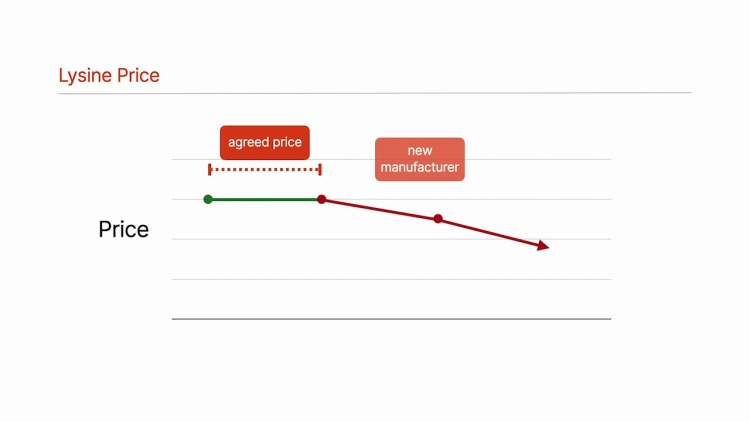United States v. Andreas
United States Court of Appeals for the Seventh Circuit
216 F.3d 645 (2000)

- Written by Sean Carroll, JD
Facts
Archer Daniels Midland Company (Archer) was a producer of several products produced from corn, wheat, and other crops, including food additives and oils. In 1999, Archer had sales of over $14 billion worldwide and 23,000 employees. Lysine was an amino acid harvested to sell to farmers to be used in animal feed. The lysine market was controlled by three companies in Korea and Japan. These three companies engaged in price fixing to maximize profits. In 1991, Archer began producing substantial amounts of lysine, and as a result global lysine prices declined sharply. The three Asian lysine companies called a meeting with Archer, at which the four companies agreed to price fixing and discussed, but did not agree to, allocation of sales volumes among the companies. Despite the price-fixing agreement, the lysine companies often underbid the agreed-upon price. With no market allocation agreement, the companies had incentive to cheat on the price. The companies eventually agreed to production caps and allocated market shares. They also agreed to purchase from each other any lysine that went unsold under the maximum production allotments. The companies revisited their price-fixing agreement on occasion to update the price on account of production costs and other variables. Meanwhile, Mark Whitacre, an Archer executive, had been embezzling funds from Archer. Whitacre eventually became an informant for the Federal Bureau of Investigation and exposed the price-fixing scheme. The United States (plaintiff) charged Archer executives Michael Andreas and Terrance Wilson with conspiring to violate § 1 of the Sherman Act. Both men were convicted and appealed their convictions.
Rule of Law
Issue
Holding and Reasoning (Kanne, J.)
What to do next…
Here's why 899,000 law students have relied on our case briefs:
- Written by law professors and practitioners, not other law students. 47,000 briefs, keyed to 994 casebooks. Top-notch customer support.
- The right amount of information, includes the facts, issues, rule of law, holding and reasoning, and any concurrences and dissents.
- Access in your classes, works on your mobile and tablet. Massive library of related video lessons and high quality multiple-choice questions.
- Easy to use, uniform format for every case brief. Written in plain English, not in legalese. Our briefs summarize and simplify; they don’t just repeat the court’s language.







